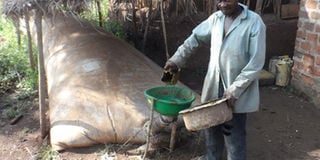Prime
Three farmers’ experiences with putting farm waste to good use

Karoli Kamuli uses the waste from his cattle to make biogas for cooking
What you need to know:
Cow dung is a common sight at farms and is treated as waste. But as Esther Oluka found from these two farmers, it can be a lot more useful to produce fuel for domestic activities such as cooking and to make fertiliser for crops
My name is Kalori Kimuli, a farmer in Kiziiko, Tirobigo, in Mpigi District, who rears several domestic animals such as cattle, goats, sheep, chicken and pigs. I have been doing this for the past ten years. Right now, I have five sheep, eight pigs, 10 goats, 15 cows and 30 chicken.
Besides rearing animals, I grow bananas on a two-acre piece of land. But much as I earn profits from these different activities, the money made is not enough to look after my family. I have a wife and three young children aged 16, 11 and nine.
For instance, out of all the domestic animals, the cows, goats and chicken are the most rewarding since they are a constant source of milk and eggs. I sell both cows’ and goats’ milk on a daily basis at a price of Shs600 per litre to my village mates.
Helpful
For the eggs, I do sell them weekly at a price of Shs200 each. I also sell each layer between Shs15,000 and Shs20,000. The broilers are from Shs16,000 to Shs18,000.However, the pigs are not as rewarding as the other animals since these do not give me milk or eggs.
I just have to sell the whole animal in order to get money. The piglets cost more than Shs 20,000 depending on the size one wants. I sell them on an annual basis. That is the only time I make money from them.
There are harvests from my banana plantations occasionally. When they get mature, the price for each bunch ranges between Shs 20,000 and Shs 30,000. I used to rely on fertilisers from shops to use in the banana plantations. However, this changed in January last year when I was approached by some people from the Department for International Development.
They sold me the idea of purchasing a PVC bio-digester. When I asked them what purpose it would serve, they replied that it would help me generate biogas, which is helpful as fuel for cooking as well as slurry for manure. Then, I asked them where I could find this PVC bio-digester. They said they were going to give it to me free of charge.
A few weeks later, they came back, dug a wide hole, about two feet onto the ground and placed it there. Before leaving, they instructed me how to operate it. Every morning, I gather dung from the cows. Though I do not use wastes from the chicken, pigs, goats and sheep since theirs are produced in smaller quantities.
I also collect dung from some of the cows in the neighbourhood as well. I do the dung collection for about a week. Then I put everything in a big water drum. Each day tafter the collection, I add a bit of water so that the content remains soluble.
During the first day of the second week, I mix up everything until the solution becomes “porridge-like”. After this, I feed the manure onto the digester five times. I do the measurements using a 20-litre jerry can. Afterwards, I leave the mixture settle for 21 days.
After this period, the gas will have been formed in the digester. It travels through a pipe up to an outlet that is found in the kitchen. This outlet is connected to a stove that I use for cooking in the kitchen. I was using firewood for cooking before but not anymore.
The gas lasts for more than two weeks, generally depending on how one uses it. When the gas gets finished, the slurry is what remains behind inside the digester. It is what I use to fertilise the soil in my banana plantation. I noticed a huge difference with this kind of manure compared to the fertilisers I used to buy.
Saving costs
For instance, I noticed that the manure makes the banana plant grow at a somewhat faster rate hence making it mature faster. The banana fingers are also quite bigger in size and the plant is not easily affected by various diseases. On the other hand, it is also cheaper since one can easily obtain it from the backyard of their homes.
This is unlikely with the other fertilisers, which are expensive and I could only buy them when I had the money. Otherwise, I am so happy that the bio digester idea was sold to me. It has really helped me save a lot of money since I no longer spend on firewood and fertilisers.
===========================================================
I sell manure to supplement my income
I am called Jane Nakawuki, 36 years, a peasant farmer in Kiziiko, Tirobigo, Mpigi and I earn a living by selling milk on a daily basis from my 30 cows. The price of a cup is Shs500. On average, I can get about Shs30,000 in profits in a day. However, this money has not always been enough to provide for me and my six children.
I was always looking for a way to supplement this income with another income-generating enterprise. I eventually settled on one in 2011. I received a bio digester (which is known as a flexible balloon bio-digester) from some generous people, who said that they were from the Department for International Development, in the UK.
Besides me, they were other people in the village who were given bio digesters as well. I do not remember how many they were though. But it was part of a project in this area.
They told me that it could emit biogas, which is very helpful for cooking. Therefore, I did not have to rely on using firewood or charcoal for cooking anymore. Also, they went ahead to tell me that the residue known as the sludge or slurry that remains after the gas is finished from the digester can be used as a fertiliser in a garden.
When I told them that I did not have plantation where to apply the sludge, they proposed that instead I sell it instead in order to make extra money. That is what I decided to do then.
I sell the sludge, measuring it in a five-litre jerry can. Each is at Shs1,000. I make the sales every fortnight. On average, I can make about Shs 20,000. This is the money I supplement onto that earned from milk sales.
====================================================
Expert take: Formation of slurry and its benefits
Swaib Semiyaga, an environmental public health engineer and a teaching assistant, Department of Civil and Environmental Engineering, Makerere University explains that slurry is produced from the biogas units during anaerobic digestion of organic matter.
It is a valuable organic fertiliser that can be applied directly to the fields or mixed with other organic material to improve crop yields. Semiyaga points out the following outstanding benefits of using slurry as a fertiliser:
• If applied for over a long period of time, it increases activities of micro-organism in the soil, improves the soil aeration, makes the soil softer hence reducing its hardness, slurry enhances water holding ability, therefore reducing erosion caused by wind and water.
• It gives a higher chance for crops to yield faster compared to other ordinary fertilisers. This because the liquid form substance contains water (more than 90 per cent), which may not be contained in other fertilisers. So, applying it even in periods of low or no rainfall can supply additional water to crops, which is also needed for plant growth.
• Applying slurry can reduce 30 per cent to 100 per cent development of insects and diseases. If 10 per cent of pesticide in volume was mixed into slurry,, efficiency of the pesticide would increase.
-Esther Oluka



